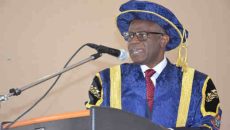When Professor Longsmas Sambo Wapmuk assumed the leadership of the Industrial Training Fund, ITF, in 2006, as director-general/chief executive officer, DG/CEO, there were mounting expectations that he would turnaround the organisation and repotision it as the number one training and development institution in Nigeria and one of the best in the world. Wapmuk has lived up to the expectations, particularly during his first four-year tenure, retooling and expanding the existing skills training centres in Ikeja, Kano and Jos amongst other landmark achievements. Based on his excellent perfomance, he was reappointed by President Goodluck Jonathan in 2010 for a second tenure. Wapmuk brought his vast experience in both the private and pubilic sectors to bear on ITF and the result is there for all to see. He rose to the position of Permanent Secretary in Plateau State and later became Deputy Registrar of the National Open University before a stint at the University of Jos, where he was director, Consultancy Services Division and head, Department of Political Science. In 2003, he was appointed manager, Jos Study Centre, National Open University of Nigeria, from where he was appointed DG/CEO of ITF in 2006. In this interivew, Wapmuk talks about the impact of the institution on national development, its challenges, achievements, and his legacies among others. Excerpts.
What are your achievements so far as DG of ITF?
Yes, we rebranded the organisation by embarking on a publicity drive to let people know what we are doing, because the organisation is doing a good job but not publicising itself. We came up with a blueprint and strategy on how to take the fund to greater heights and we were able to improve the conditions of service of the staff through realignment and repositioning; mobilisation of all relevant stakeholders on the need for increased skills acquisition. One of our major achievements is the collaboration with other institutions abroad such as the Institute of Technical Education, ITE, Singapore, SENAI, Brazil and Galilee International Management Institute, Israel, where we have organised a training session for 70 of our staff tuition-free. We refocused the organisation more technically so that we will be able to provide good skills for training our youths by establishing many centres in many parts of the country. Already established are three industrial skills training centres in Ikeja, Kano and Jos. The centres also provide National Apprenticeship Scheme, NAS, for training of young entrants and other skilled workers. ITF has proposed the establishment of 37 Industrial Skills Training Centres to be located in the six geo-political zones of the country. ITF, collaborating with ITEE (Singapore), has established a Model Skills Training Centre, MSTC, in Abuja, which runs training programmes in Facility Technology, Electrical/Electronics, ICT, Mechatronics and Culinary. Also, the Nigeria Employers’ Consultative Association, NECA, in collaboration with ITF floated a skilled Manpower Development Programme, tagged Technical Skills Development Project, TSDP. Also, the Small and Medium Enterprises Development Agency, SMEDAN, will train the student and will be referred to Bank of Industry, BOI, for funding through the National Enterprise Development Programme, NEDEP, and they also monitor, assist and promote the schemes of the agency. We have been able to expand our area offices from nine to 32 offices.
What challenges have you encountered in running ITF?
When I came into office as the DG, I met a very big organisation and many people working devotedly, but there were some crises which led to the suspension and subsequent dissolution of the Governing Council. The management that I took over had a lot of problems and I found out that it did not have a good image at that time, because people did not know what the agency was all about. There was labour problem, working conditions were poor, low salary for the staff and I came in to face the problem of retrenchment of 400 members of staff. The agency did not have adequate funds for its operations, and absence of infrastructural facilities and economic factors like policy reversals, high and double taxations affected the agency. So the major challenge is finance because no development can happen in Nigeria without development of skills and setting up training centres.
How has the agency impacted individuals and institutions in the country?
The agency has been able to stimulate performance, improve productivity and induce value-added production in industry and commerce, through its Students Industrial Work Experience Scheme, SIWES; Vocational and Apprentice Training Programmes, for those who dropped out of school and those who never had a chance to go to school, to help them acquire skills to be self-reliant. It has also helped them to build capacity for graduates and youths to be self-employed, in the context of Small Scale Industrialisation, in the economy. We have made an impact by building standard skilled centres for the youths to acquire skills and perform better for themselves and the nation at large. The training will reduce youth restiveness and contribute immensely to wealth creation, poverty reduction and enhance national unity.
How have you being able to coordinate all the branches of ITF in the country?
We have a structure that guides us, the 13-member Governing Council; the Directorate; (i.e. office of the DG and Chief Executive), 10 headquarters departments each headed by a director; four units attached to the DG’s office, each headed by deputy director; 32 area offices (nationwide); four training centres, five Skills Training Centres (ISIC Ikeja, ISTC Kano, MSTC, Abuja, ISTC Lokoja, and CFE Jos), and so far so good. We have been able to achieve that through the coordination of our directors in each centre who report directly to the DG. We have 10 departments and four units coordinated by the field service director, who returns to headquarters for annual review on performances monthly. We also review performances and set targets for the year.
What legacies would you leave on completion of your tenure?
All the improvement as a management is our legacy and we want to build more training centres to improve human capital development in Nigeria. At least one in each state, and it will certainly help to improve the fortunes of the nation.
Follow Us on Social Media“We have made an impact by building standard skilled centres for the youths to acquire skills and perform better for themselves and the nation at large. The training will reduce youth restiveness and contribute immensely to wealth creation, poverty reduction and enhance national unity”






 WhatsApp us
WhatsApp us